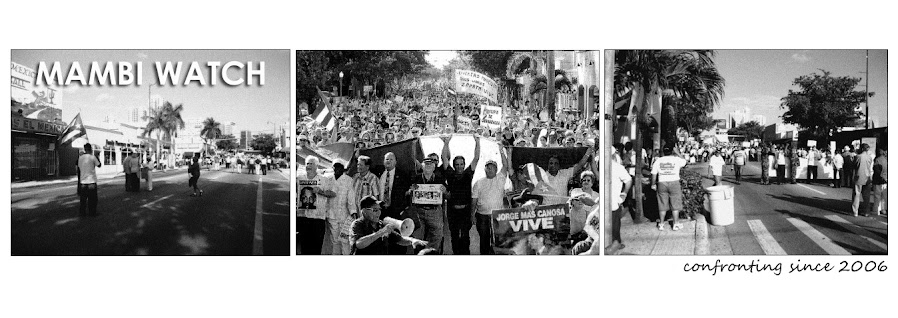 Tomorrow (Friday), Cristina Khuly's documentary, The Shoot Down, will debut in several theaters across Florida. One film reviewer described it as "a powerful, moving and beautifully made piece of cinematic art." And even though this film is about one tragic episode, I think anyone who's interested in the history of US/Cuba relations will benefit in seeing this film. According to the official website, "10 years of research, government documents, transcripts and never-before seen news footage" have been reviewed and collected for the execution of this documentary. I'm certainly looking forward to it. Select theaters from Los Angeles to Chicago will also be screening this film.
Tomorrow (Friday), Cristina Khuly's documentary, The Shoot Down, will debut in several theaters across Florida. One film reviewer described it as "a powerful, moving and beautifully made piece of cinematic art." And even though this film is about one tragic episode, I think anyone who's interested in the history of US/Cuba relations will benefit in seeing this film. According to the official website, "10 years of research, government documents, transcripts and never-before seen news footage" have been reviewed and collected for the execution of this documentary. I'm certainly looking forward to it. Select theaters from Los Angeles to Chicago will also be screening this film.The shoot-down of the Brothers to the Rescue (BTTR) planes on February 24, 1996 has been written about extensively. So I will attempt to be brief in providing a summary of the escalation and subsequent events of this tragedy.
Founded in 1991, BTTR sought to use Cessna aircrafts to provide humanitarian relief to stranded Cuban rafters in the Florida Straits. They flew hundreds of rescue missions due to the increase of Cuban rafters fleeing the economic collapse of Cuba's Special Period. The exodus of rafters soon decreased after 1994 when Cuba and the US agreed on terms to stem the flow. The mission of BTTR soon changed from a humanitarian one to a strictly political one.
Thereafter, José Basulto, co-founder of BTTR, decided to exercise civil disobedience with his Cessna by flying into Cuban airspace and over Havana, which he did on two separate occasions (in defiance of internationally agreed standards). By January 1996, after several official warnings by the Cuban government to the US State Department, it was clear that a shoot down of the BTTR planes was eminent. Communication between liaisons of the State Department and the Miami Federal Aviation Administration office revealed increasing concern that the "latest overflight can only be seen as further taunting of the Cuban Government" and that the "[w]orst case scenario is that one of these days the Cubans will shoot down one of these planes."
In coordination and solidarity with a planned dissident conference (by Concilio Cubano) in Cuba , three BTTR planes headed for Cuban airspace on February 24, 1996, but were confronted by Cuban military jets which shot down two of the three Cessnas over international waters. Immediately, the late Jorge Mas Canosa, former chairman of the powerful Cuban American National Foundation, called it an "act of war." Recalling events of that day, Richard Nuccio, President Clinton's "special adviser for Cuba" at the time, said that the President "had considered a memo from the Joint Chiefs of Staff on the options for attacking Cuban air force units and defense structures" as a response. Instead, the President sought to tighten the US embargo.
But, it also became clear that the US was now going to stop any future activity by Miami exile organizations that could be seen as a provocation by the Cuban government. The US was on high alert to stop subsequent exile demonstrations in 1997 and in 1999, even seizing property from one organization that threatened to cause a possible provocation. The US also lessened any hostile rhetoric between the two nations with a 1998 Pentagon report declaring that Cuba does "not pose a significant military threat to the U.S. or to other countries in the region."
Families of the four men who were killed on Feb. 24, 1996 soon won lawsuits and indictments against the Cuban government and those involved with the shoot-down. Millions of dollars were awarded to the families from Cuba's frozen assets, and the indictments were a symbolic victory for the hard-line, who now call for further indictments of Cuba's leaders.
Cristina Khuly, director of The Shoot Down, appeared on Radio Mambi last Tuesday evening (Martha Flores show) and mentioned how important this film is. She felt that this story had to be told to counter other films like The Motorcycle Diaries and other future films about the life of Che Guevara. Khuly appeared on the show with Rep. David Rivera of the Florida House who reminded everyone to see the film and remember why we have an embargo on Cuba. Rep. Rivera sponsored legislation in 2006 that banned state and private dollars being used for academic travel to Cuba by State universities. But, the universities are now fighting back.
But, Khuly hopes the film and its story will lead to constructive negotiations between the U.S. and Cuba in a post-Fidel era.
"I wanted to tell the story, essentially to have a record of what really occurred and have it be a window into our relationship with Cuba, and hopefully we can learn from mistakes that we've made."
[Photo above of Cristina Khuly by Frank Franklin II/AP]

No comments:
Post a Comment